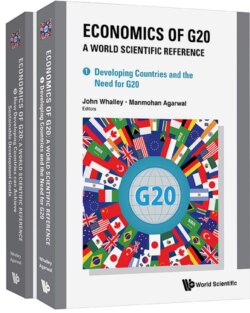Читать книгу Economics of G20 - Группа авторов - Страница 43
На сайте Литреса книга снята с продажи.
Development Considerations and the Core G20 Work Stream
ОглавлениеThe G20 has been moving towards paying greater attention to development in its work programme, despite issues of financial reform and stability and those of appropriate fiscal and monetary policies to deal with these continue to preoccupy the G20 leaders because of the ongoing macro and financial problems in the Eurozone and elsewhere. They have reiterated their commitment to delivering on all three aspects of the SSBG and that balance implies not only balance in the external accounts but also narrowing the income gap between the developed and developing economies. They have also stated that the Framework includes raising income levels in developing countries. In these ways, development is already incorporated into the work stream of the G20.
The FBSSG is accompanied by a mutual assessment mechanism that allows the leaders to examine the impact of national policies on imbalances and to ensure that countries deliver on their promises for the monetary and fiscal policies they intend to adopt. The Mutual Assessment Process (MAP) does not, however, include any assessment of national policies from the viewpoint of how they affect development in developing countries and modification for this effect would raise the profile of development in the G20.
The leaders have also tried to move beyond mere statements of intent on development and this implies incorporation of development in their work plan. The Working Group on Development has been given the mandate to develop a process by which the impact of national policies on development could be analysed and assess how to make governments accountable for their policies. At any summit, members provided details of their proposed policy changes and at subsequent summits they provide information on the actions that have been taken. But by and large, the information provided by developed countries dealt with their fiscal and monetary policies and changes in the financial sector rules and procedures. A number of developing countries also dealt with actions with a predominantly development aspect. For instance, the Argentine government mentioned the implementation of its water and sanitation programme, Australia and Brazil mentioned their infrastructure investment, South Africa reported on its actions to reform health financing to improve access to health facilities and Indonesia reported on the introduction of a community-based programme to help poor communities.
In the medium to longer term, there are varying options for the G20 which depend on the degree of activism they choose to adopt. The incremental approach is to concentrate efforts on coordination between international agencies with overall direction through studies and broad frameworks. However, such a minimalist approach runs the risk of the G20 and particularly its developing country members losing legitimacy in the eyes of other developing countries. Some analysts argue that taking development on board was itself an attempt to silence criticism particularly by the group of 23 smaller countries from both the North and the South of the summit architecture (Fues and Wolff, 2010a).10 A more activist approach would be to move in the direction of strengthening the two weaknesses of the G20, i.e. lack of resources and legal structure, as these apply to development.
Generating new resource commitments from members at a time of global economic weakness may be difficult, if not infeasible. But growth has slowed in developing countries with a decline in the share of exports to GDP in these countries and some declines in the share of investment in GDP and of FDI inflows and a worsening current account position. This worsening is more pronounced in the least developed countries where the growth rate has halved from that achieved in the pre-crisis years. Investment and government expenditures in these economies tend to be procyclical. The activities of the MDBs need to be more anti-cyclical (UN, 2009). But for this, MDBs need more resources and the World Bank is reaching the limit of its lending capacity without additional capital subscription.11 The G20 could contemplate, in the first instance, redeploying current arrangements to move resources more firmly under G20 direction and incrementally increase their size. An example might be the idea of consolidating all bilateral aid programmes under a new G20 entity with members closing ministries of development (with administrative savings possibly shared between the G20 pool and individual members).12 Another example might be the transfer of all anti-dumping penalties collected to the G20 pool. The resource increment would be small, but incrementally over time as an addition to existing multilateral flows it could grow.
On legal structure, the G20 could concentrate on having decisions in communiqués incorporated in some form into domestic law. The commitment made, several times, to complete the Doha Round of the WTO might be an example. But for such an evolution to occur, development of a greater degree of trust between the members of the G20 might be needed. This might also determine how actions in the area of development might proceed. These could be discrete steps in particular areas where there is agreement. More holistic approaches and actions might have to wait for greater agreement on how and through what policies development can be accelerated.
